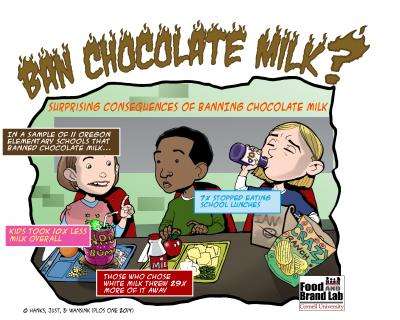Banning chocolate milk in school cafeterias decreases sales and increases waste

To some, banning chocolate milk from elementary schools seemed like a good idea, but new Cornell University research shows that removing chocolate milk from school menus has negative consequences.
"When schools ban chocolate milk, we found it usually backfires. On average, milk sales drop by 10 percent, 29 percent of white milk gets thrown out, and participation in the school lunch program may also decrease," reports Andrew Hanks, lead author and research associate Cornell's Dyson School of Applied Economics and Management. "This is probably not what parents wanted to see."
The Cornell study, which included professors David Just and Brian Wansink was published today in PLOS ONE; it examined what happened when chocolate milk was banned in a sample of Oregon elementary school. It shows what happens when chocolate milk-loving kids are suddenly confronted with something paler – and proposes what researchers hope can be a healthful compromise.
"Members of the school district's PTA were adamantly opposed to offering chocolate milk in the cafeterias, claiming it was as bad as soda," said Hanks. "While this policy does eliminate the added sugar in chocolate milk, it also introduces a new set of nutritional and economic consequences. Children typically don't choose foods for health, but rather for taste."
Nutritionally, after the milk substitution, students consumed less sugar and fewer calories; however, they also consumed less protein and calcium.
Here's what the behavioral economics experts propose: "Instead of banning chocolate milk, make white milk appear more convenient and more 'normal,'" said Wansink co-author and Director of the Cornell Food and Brand Lab. "Put the white milk in the front of the cooler, and make sure that at least one-third to half of all the milk is white. We've found that this approach can increase sales by 20 percent or more."
More information: Andrew S. Hanks, David R. Just, and Brian Wansink. (2014). "A Pilot Study Evaluating the Cafeteria Consequences of Eliminating Flavored Milk," PLOS ONE, April 16. dx.plos.org/10.1371/journal.pone.0091022
















